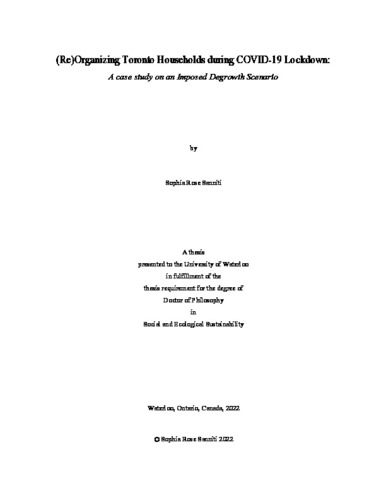| dc.description.abstract | By design or by disaster, the growth-oriented capitalist economy must come to terms with the biophysical limits of our finite planet. Many ecological economists make the intentional contraction – or degrowth – of total material and energy use in the global economy a precondition to an environmentally sustainable low-carbon alternative. However, in the context of increasing and concurrent social and environmental upheaval, degrowth “by design” should not be the only avenue explored – nor should a smooth economic transition be presumed. Degrowth research and practice must confront the devastating implications of extreme events, and be ready to counter capitalism’s exploitation of such occurrences as they increase in scale and intensity over time.
Situating the COVID-19 pandemic lockdown measures as an imposed degrowth scenario, my thesis explores the possibilities and challenges of mobilizing economic alternatives during times of disruption. Through an exploratory case study, I investigate the experience of 42 Toronto, Canada households as they rapidly respond to an ongoing public health crisis to illuminate strategies for, and barriers to, engaging in degrowth politics and practice. First, I examine parallels between the pandemic lockdown and the degrowth imperative to establish the novel concept of an imposed degrowth. Second, I identify potential subjects, sites and tactics of a degrowth revolution, as well as barriers to realization, at the household scale. Third, building on the experiences of my participants, I enhance degrowth policy recommendations for a more robust response to an increasingly unstable climate future. My research aims to underscore the value of the degrowth imperative for responding to disruptive events while actively mobilizing sustainable economic alternatives.
Following Latouche’s “Eight R’s of Degrowth”, my study demonstrates the role of households in cultivating a multiplicity of degrowth politics and practices. This includes re-evaluating personal and professional priorities, strengthening social networks, and calling for the public provisioning of universal basic needs. Participating households also faced a number of barriers to action, including the exacerbation of social harms, the loss of crucial services, and conflicting public health guidelines. The outcomes of this study make visible the labours, tensions and contradictions at play in the process of the everyday degrowth revolution. The realities of the pandemic further serve to expose the limits of an economic system predicated on growth, and underscore the importance of developing alternatives in the face of a climate uncertain future. The question becomes whether this crisis builds the impetus needed to mobilize such alternatives, or whether an even greater crisis will incapacitate entire economies before alternatives can be implemented. | en |

